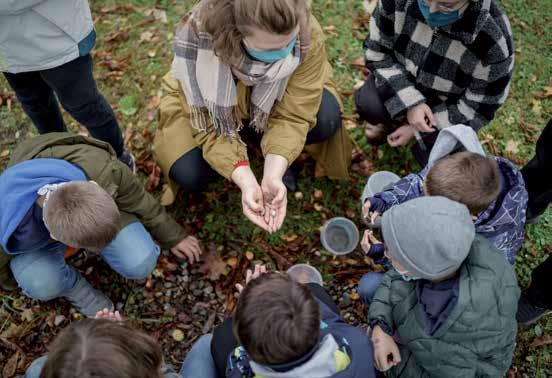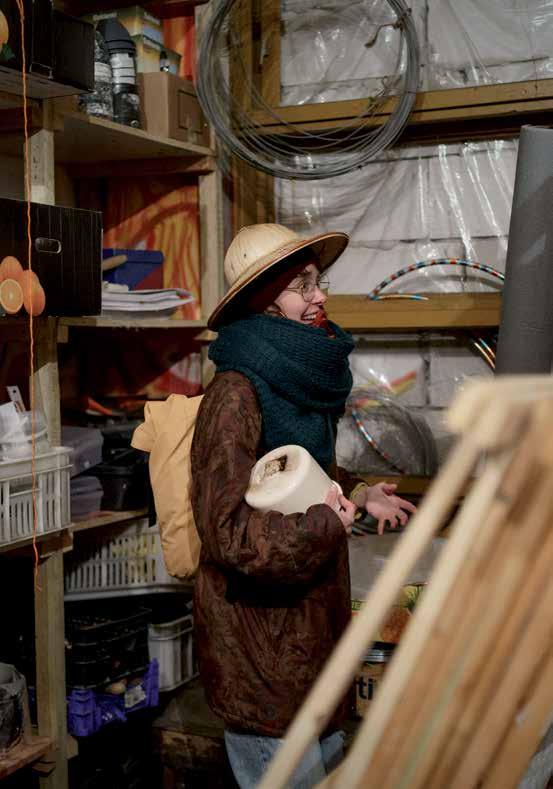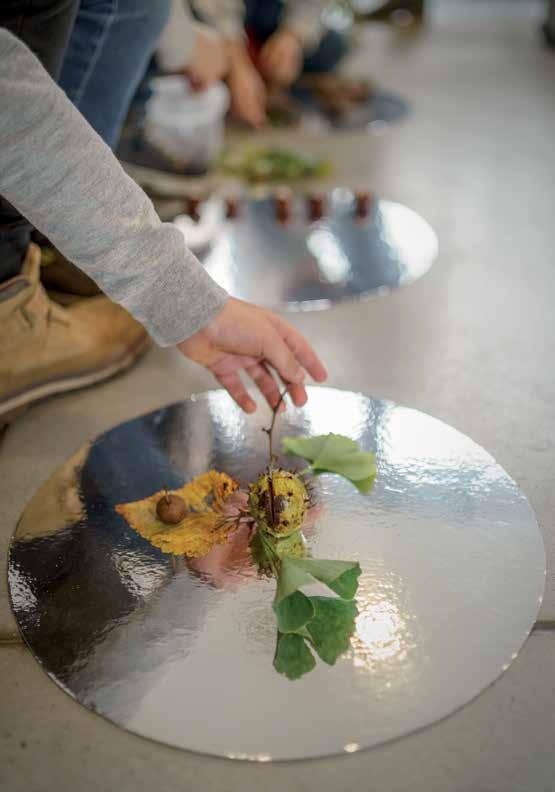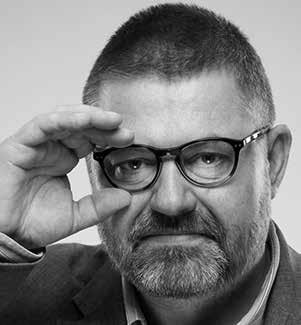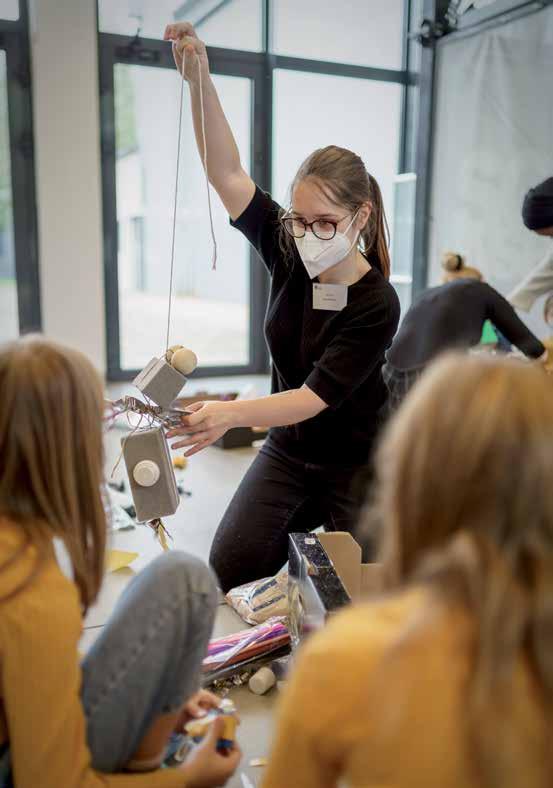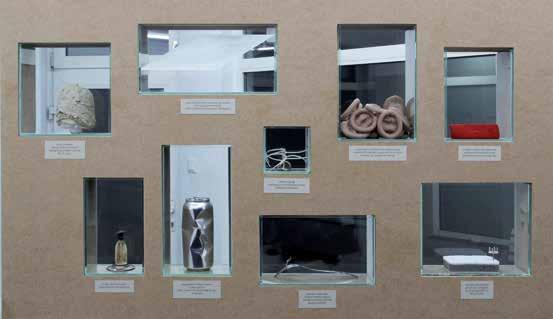
4 minute read
Marcin Berdyszak Creation to be continued
Kreacji ciąg dalszy Marcin Berdyszak
Na koniec odwołam się do mitu o Gilgameszu. Mit jest przecież – jak mówi Rollo May –„wglądem w nieskończoność”. Dziś, kiedy to po euforii globalizacji i otwarcia się wszystkiego na wszystko, żyjemy w okresie pandemii koronawirusa i tak naprawdę nie wiemy, czy jest on tworem ludzkim, czy też naturalnym, nie ma to tak naprawdę znaczenia w kontekście tego, co nam czyni. Pomimo, iż statystki umieralności ludzi w kontekście innych chorób są znikome, to jednak działania podejmowane od informacji po opiekę medyczną i ograniczanie wolności jakby mają nam nachalnie przypomnieć o naszej śmiertelności, jak i uczulić nas, Homo sapiens, że zagrożeniem dla nas może być drugi przedstawiciel gatunku.
Advertisement
Przypomnę, że problem śmiertelności to problem, który trapił ludzkość od samego początku. Większość wierzeń religijnych śmierć uczyniło jednym z głównych sensów życia. Wierzenia i systemy uczyły Homo sapiens, jak się pogodzić ze śmiertelnością. Zagadka śmierci nie została rozwiązana, a wydawałoby się, że już byliśmy tak blisko, skoro odkrycia naukowe dają nam realne możliwości przedłużania życia w postaci przeszczepów, protez, implantów, lekarstw. Wszystko się zawaliło, a przecież wydawałoby się, że nasz porządek wyobrażony powinien być na to przygotowany. Tak jak władca miasta Uruk Gilgamesz nie mógł znaleźć antidotum na nieśmiertelność swojego przyjaciela Enkidu i tylko bogatszy o wiedzę i doświadczenie wrócił, rozumiejąc tym samym, że bogowie stworzyli człowieka i uczynili go śmiertelnym, a człowiek musi nauczyć się z tym żyć, tak my musimy nauczyć się żyć z nowymi śmiertelnymi zagrożeniami, które przecież pośrednio bądź bezpośrednio są efektami naszych działań.
Medycyna dokonuje postępów, również rozwój sztucznej inteligencji i cyberprzestrzeni może stanowić przyszłą szansę dla nieśmiertelności, może naszego porządku wyobrażonego, a może gdzieś umieszczonej naszej świadomości, może ciało i świadomość cybernetyczna będą istniały oddzielnie. Może nasze ciało umrze, ale my jako świadomość nie. Tego nie wiemy i to należy także do obszaru kreacji i mitu a w konsekwencji wartości wyobrażonych. Covid nam o tym przypomniał i jednocześnie przywiązani i uzależnieni od porządków wyobrażonych trudno akceptujemy to jako realne zagrożenie. Może to ściana, do której doszedł humanizm stawiający na piedestał Homo sapiens, a cała sytuacja uzmysławia nam, że jesteśmy potencjalnym zagrożeniem dla nas samych.
Oczywiście łatwiej nam akceptować a nawet rozumieć zagrożenie, na przykład terrorystyczne i traktujemy to po tylu latach jako coś normalnego, ale dlatego, że jest ono wynikiem działań w sferach wyobrażonych, które nam porządkują świat. Covid jest zagrożeniem jakby ze świata realnego, naturalnego, wręcz biologicznego. Obudził nas uśpionych w poczuciu bezpieczeństwa, które miało nam nie grozić ze strony bakterii czy wirusów, tylko świata wyobrażonego, bo tak jesteśmy wyedukowani, a przecież te dwa światy mogą kolaborować, z naszą zgodą bądź też bez niej, o czym się chyba przekonaliśmy.
Creation to be continued
Marcin Berdyszak
Finally, I will refer to the myth of Gilgamesh. The myth is, after all, as Rollo May says, “an insight into infinity”. Today, when, after the euphoria of globalisation and the opening of everything to everything, we are living in a period of a pandemic of coronavirus and we do not really know whether it is human or natural product, and it does not really matter in the context what it does to us. Although the statistics on human mortality in the context of other diseases are insignificant, the actions taken from information to medical care and restriction of liberty are, however, as if they were to forcefully remind us of our mortality and to alert us, Homo sapiens, that we could be threatened by a second species.
I would remind you that the problem of mortality is a problem that has troubled humanity from the very beginning. Most religious beliefs have made death one of the main meanings of life. Beliefs and systems have taught Homo sapiens how to accept mortality. The mystery of death has not been solved, and it would seem that we were already so close, since scientific discoveries give us real opportunities to prolong life in the form of transplants, prostheses, implants and medicines. Everything has collapsed, and yet it would seem that our imaginary order should be prepared for this. Just as the Lord of the city of Uruk, Gilgamesh, could not find an antidote to the immortality of his friend Enkid and only came back with knowledge and experience, thus understanding that the gods created man and made him deadly, and man must learn to live with it, so we must learn to live with new deadly threats, which, after all, are directly or indirectly the result of our actions.
Medicine is making progress, and the development of artificial intelligence and cyberspace may also represent a future opportunity for immortality, maybe our imaginary order, or maybe our consciousness placed somewhere, maybe the body and cyber consciousness will exist separately. Perhaps our body will die, but we as consciousness will not. We do not know this, and this also belongs to the area of creation and myth and, consequently, to imaginary values. Covid has reminded us of it and, at the same time, we find it difficult to accept this as a real threat when we are attached to and dependent on the imaginary order.
Perhaps it is the brick wall which has been reached by humanism placing Homo sapiens on the pedestal and the whole situation makes us realise that we are a potential threat to ourselves. Of course, it is easier for us to accept or even understand a terrorist threat, for example, and after so many years we are treating it as something ordinary but because it is the result of actions in imaginary areas that are putting the world in order. Covid is a threat from a real, natural, even biological world. It has awakened us sleeping in a sense of security, which was not supposed to threaten us with bacteria or viruses, but with the imaginary world, because that is how we are educated, and yet these two worlds can collaborate with or without our consent, as we have probably seen.

